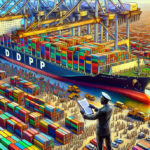What Does DDP Stand For?
DDP stands for Delivered Duty Paid. It is a widely used international trade term, known as an Incoterm, that signifies the seller's responsibility to deliver goods to the buyer at a specified destination, covering all costs and risks associated with the shipment. This includes transportation fees, customs duties, and taxes. In this article, we delve into the origins and evolution of DDP, its importance across various industries, and the pros and cons of implementing DDP Incoterms in business operations.
Origins and Evolution of DDP
Introduced by the International Chamber of Commerce (ICC) in the 1953 Incoterms, DDP has undergone several revisions to adapt to the changing landscape of global trade. Initially, it was part of the "Costs, Insurance, and Freight" (CIF) terms but was redefined to better delineate the seller's obligations. The latest iteration, Incoterms 2020, continues to support DDP as a term that places maximum responsibility on the seller, ensuring clarity in international transactions.
With the surge in e-commerce growth and the expansion of cross-border trade, DDP has become increasingly relevant. It offers a standardized framework that facilitates smoother transactions between businesses and consumers across different countries, minimizing misunderstandings and disputes.
Significance of DDP in Various Industries
DDP plays a pivotal role in multiple sectors by providing a clear and efficient method for handling international shipments. In the e-commerce sector, DDP simplifies the purchasing process for consumers by including all costs upfront, enhancing customer satisfaction and trust. For manufacturers, it ensures timely delivery of products to international markets, fostering strong relationships with global clients.
Benefits for Small Businesses
Small enterprises venturing into international trade find DDP advantageous as it abstracts the complexities of international shipping and customs clearance, allowing them to focus on growth and market expansion.
Impact on the Manufacturing Industry
Manufacturers benefit from DDP by ensuring that their products reach customers without unexpected costs, thereby enhancing brand reputation and encouraging repeat business.
Legal Implications and Compliance
Using DDP Incoterms entails significant legal responsibilities for sellers. Compliance with the destination country's laws, including import regulations, product standards, and labeling requirements, is mandatory. Failure to adhere can result in legal penalties, delays, or even the seizure of goods.
It's crucial for businesses to conduct thorough due diligence and possibly consult with legal experts or customs brokers to navigate the intricate legal landscape associated with DDP transactions.
Advantages and Disadvantages of DDP Incoterms
Advantages
- Simplified Process for Buyers: All costs are covered upfront, providing transparency and ease for the buyer.
- Enhanced Seller Control: Sellers manage the entire shipping process, ensuring consistency and reliability.
- Market Expansion: Facilitates entry into new markets by handling all logistical complexities.
Disadvantages
- Higher Costs for Sellers: Sellers bear all shipping, customs, and tax expenses, which can be substantial.
- Increased Risk: Responsibility for potential delays, damage, or loss during transit rests with the seller.
- Limited Buyer Control: Buyers have less oversight over the shipping process, which may lead to dissatisfaction if issues arise.
Comparing DDP with Other Incoterms
Understanding the differences between DDP and other Incoterms is essential for businesses to make informed decisions. For instance, under FOB (Free on Board), the seller's responsibility ends once the goods are loaded onto the transport vessel, shifting subsequent costs and risks to the buyer. In contrast, DDP places full responsibility on the seller until the goods reach the buyer's specified location.
Key Differences
- Risk Allocation: DDP assigns more risk to the seller compared to terms like EXW (Ex Works) or FCA (Free Carrier).
- Cost Coverage: Only DDP ensures that all costs, including duties and taxes, are covered by the seller.
- Customs Handling: DDP requires the seller to manage all customs formalities, unlike terms where the buyer handles these.
Implementing DDP: Best Practices and Strategies
Successfully employing DDP requires meticulous planning and robust logistics management. Here are some best practices:
Partner with Reliable Logistics Providers
Collaborate with experienced logistics companies and customs brokers who have in-depth knowledge of the destination country's regulations and can ensure smooth clearance and delivery.
Invest in Technology
Utilize advanced shipping software to streamline operations, track shipments in real-time, and manage documentation efficiently.
Comprehensive Insurance Coverage
Obtain adequate insurance to mitigate risks associated with transit, including damage, loss, or delays, safeguarding both the seller and the buyer.
Thorough Market Research
Conduct detailed research on the target market’s regulatory landscape, cultural nuances, and consumer preferences to tailor your DDP strategy effectively.
Risk Mitigation Strategies When Using DDP
While DDP offers numerous benefits, it also comes with inherent risks. Implementing effective risk mitigation strategies is essential to safeguard your business:
- Regular Compliance Audits: Ensure ongoing adherence to international trade laws and destination country regulations through periodic audits.
- Effective Communication: Maintain clear and continuous communication with all parties involved to promptly address and resolve issues.
- Contingency Planning: Develop backup plans to handle unexpected challenges such as customs delays or transportation disruptions.
- Training and Education: Keep your team informed about the latest changes in trade regulations and best practices for managing DDP transactions.
Conclusion: Is DDP the Right Choice for Your Business?
Choosing the right Incoterm is pivotal to the success of your international trade operations. DDP offers significant advantages in terms of simplifying the buyer's experience and expanding your market reach. However, the increased responsibility and potential costs must be carefully weighed against your business's capacity to manage them. By understanding the intricacies of DDP and implementing strategic best practices, businesses can leverage DDP Incoterms to enhance their global trade operations effectively.
For more insights on choosing the right trade terms and optimizing your shipping processes, consider consulting industry experts or reputable resources such as the World Trade Organization and the International Chamber of Commerce.



















